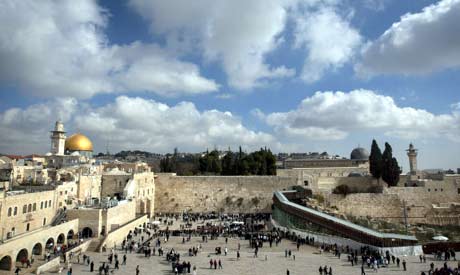
Pedestrian walkway, leading to the Al Aqsa Mosque compound, Old City Jerusalem, 8 December, 2011 (Photo: AP)
The structure, leading from Judaism's Western Wall to the sacred plaza where al-Aqsa mosque and the Dome of the Rock stand, was closed on Monday while Israel weighed plans that have stoked Arab anger to tear it down and build a sturdier bridge.
Any construction at the site can be politically explosive. During Benjamin Netanyahu's first term as prime minister, his opening in 1996 of a new entrance to an access tunnel for tourists near the compound touched off Muslim protests and gun battles in which 60 Palestinians and 15 Israelis were killed.
Netanyahu's inner cabinet, meeting on Tuesday, decided to put the ramp's demolition on hold and "to fix safety hazards" in order to "avert the danger of collapse or fire", Israel's Jerusalem municipality said in a statement.
A police spokesman said the footbridge had been reopened and fire-fighting equipment stationed nearby. The ramp is used mainly by tourists, and Muslim worshippers reach al-Aqsa through other entrances.
The span's closure was criticised by right-wing Israeli legislators who accused the government of blocking Jews from visiting an area of a city that Israel claims as its united and eternal capital.
The holy compound is in the old walled city of Jerusalem, which Israel captured along with the West Bank in a 1967 war and annexed in a step that has not won international recognition. Palestinians want the area to be part of a state they intend to create in the West Bank and Gaza Strip.
The wooden ramp was erected by Israeli authorities as a stopgap after a snowstorm and earthquake in 2004 damaged a stone bridge at the site.
Netanyahu was cautioned that removing the structure and building a new bridge could enrage Muslims, especially in turbulent Egypt, who might believe the work could damage al-Aqsa, said the government officials, who insisted no harm would come to existing buildings.
The city's senior Muslim cleric, Sheikh Mohammad Hussein, the mufti of Jerusalem, has said that Islamic religious authorities opposed demolition of the existing structure and construction of a new one.
Jews revere the sacred compound as the site of their Biblical Temple, destroyed by Roman troops in the 1st century. Surviving foundations of its Western Wall are now a focus of prayer.
For Muslims, who captured Jerusalem from the Christian Byzantines in the 7th century, Dome of the Rock marks the spot from which the Prophet Mohammad made his night journey to heaven. They refer to the plaza as the Noble Sanctuary.
Short link: